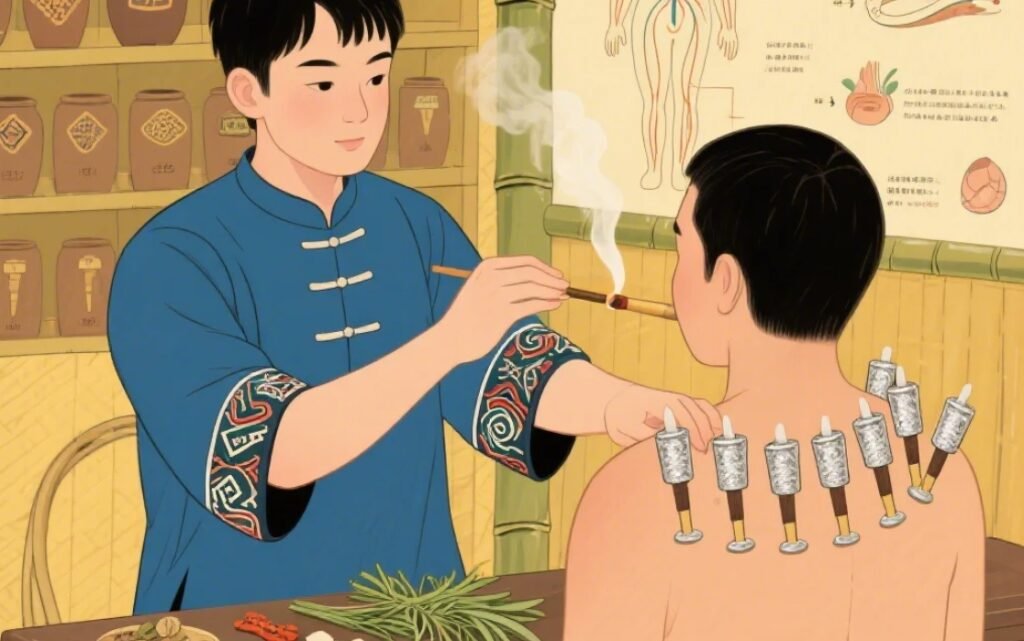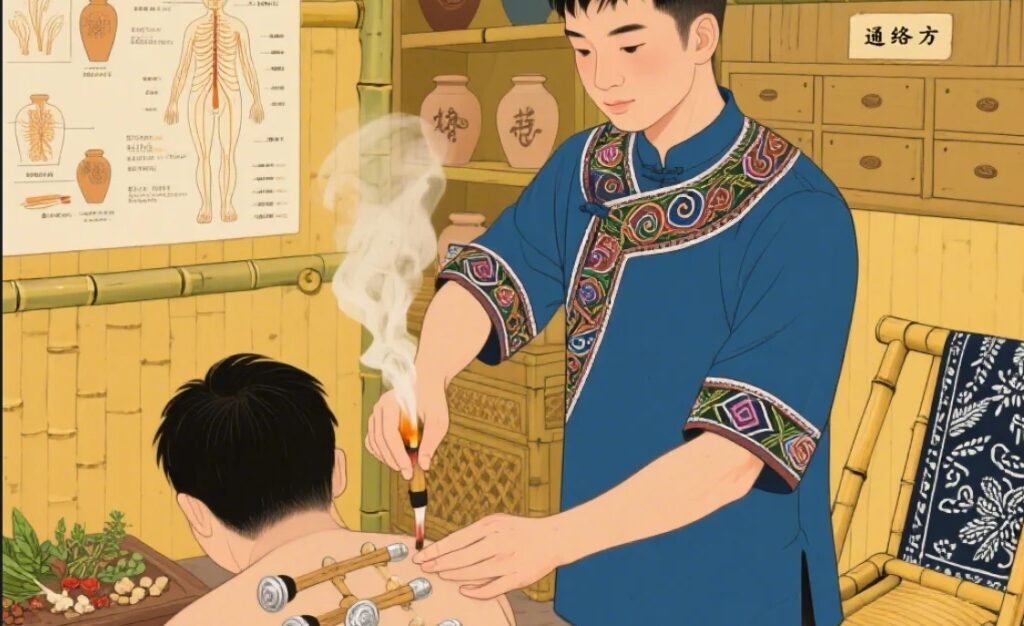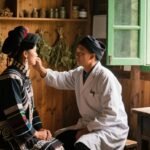Ailuo’o (Vomiting)
Overview
In Miao medicine, vomiting is called Ailuo’o, encompassing both productive vomiting and dry heaving. Causes include invasion of external wind, cold, water, or damp toxins; ingestion of unclean, raw, or overly greasy foods leading to food stagnation and upward reversal of stomach qi; emotional distress; spleen–stomach weakness; or preexisting gastrointestinal disorders.
In TCM, vomiting results from “disharmony of the stomach and rebellious stomach qi,” characterized by regurgitation of food, phlegm, or fluids from the stomach. In Western medicine, conditions such as acute/chronic gastritis, gastric mucosal prolapse, cardiospasm, pyloric obstruction, duodenal stasis, intestinal obstruction, hepatitis, pancreatitis, cholecystitis, uremia, CNS diseases, and certain infections, all presenting primarily with vomiting, may be treated with reference to this syndrome.
Miao Syndrome Classification
Ailuo’o is a minor disorder, divided into two types:
Heat-type vomiting
Cold-type vomiting
Etiology
Main causes are dampness, heat toxins, and unclean food invading the GI tract. Seasonal variations influence the pathogenic toxin. Overeating, emotional imbalance, and spleen–stomach deficiency are additional factors.

Pathogenesis
External invasion (wind, cold, damp, heat, water toxins) or unclean/raw/greasy diet → food stagnation, stomach qi reversal → vomiting.
Emotional distress or spleen–stomach weakness → impaired digestion → vomiting.
Chronic illness damages spleen–stomach qi, turning excess into deficiency and creating a mixed pattern.
Key Diagnostic Points
Diagnostic Criteria
Regurgitation of stomach contents (food, phlegm, fluids) or dry heaving.
Often accompanied by epigastric discomfort, nausea, poor appetite, acid regurgitation.
Onset may be sudden or gradual, triggered by diet, emotions, temperature extremes, foul odors, medications, or toxins.
Imaging (barium X-ray, endoscopy) and laboratory analysis of vomitus aid in diagnosis.
Related Tests
X-ray, ultrasound, CT, MRI, endoscopy as indicated.
Record vomitus volume, presence of blood/bile, residual food.
Culture for suspected bacterial food poisoning; liver function tests for viral hepatitis; toxicology for suspected poisoning; pregnancy test if early pregnancy suspected.
Differential Diagnosis
Reflux Gastritis (“Fanwei”)
Also a disorder of stomach qi rebellion, but characterized by pyloric dysfunction with long-standing regurgitation (“morning meal vomited in evening,” etc.), heavy residual food, and a longer interval between eating and vomiting. Vomitus is typically the day’s food and volume is large; epigastric distension precedes vomiting and subsides after.
Pattern Differentiation & Treatment
1. Heat-Type Vomiting
Presentation: Sudden nausea, repeated vomiting of food residue and clear fluids, chest tightness, hypochondriac fullness or pain, belching, loss of appetite.
Pattern: Heat in the stomach channel.
Treatment Principle: Harmonize the stomach, descend rebellious qi, stop vomiting.
Formula (decoction):
Zizhu xiang (Hedysarum polybotrys, zhizhuxiang) 15g
Melia toosendan (Melia toosendan, kulianzi) 15g
Tinospora sinensis (Tinospora sinensis, jishiteng) 15g
2. Cold-Type Vomiting
Presentation: Even small intake triggers vomiting, no appetite despite hunger, constipation, pale complexion, weakness, shortness of breath.
Pattern: Cold in the stomach channel.
Treatment Principle: Tonify qi, descend rebellious qi, stop vomiting.
Formula (decoction):
Pseudostellaria heterophylla (Pseudostellaria heterophylla, turenshen) 20g
Ophiopogon japonicus (Ophiopogon japonicus, maidong) 15g
Pinellia ternata processed (Pinellia ternata processed, banxia) 15g
Zingiber officinale (Zingiber officinale, ganjiang) 10g

Prevention & Care
Maintain regular schedule; guard against wind, cold, heat, and damp invasion.
Keep emotions stable; especially (helps maintain) liver qi from invading the stomach.
Dietary guidance: In spleen–stomach deficiency, eat small, frequent, warm meals; avoid raw/cold foods and cooling drugs. In stomach heat, avoid greasy, spicy foods, alcohol, and warming herbs; quit smoking.
In persistent vomiting, rest in bed; take small frequent sips of warm water or ginger tea; use mild-tasting medicines to reduce gastric burden.
Commentary
Miao medicine teaches that human health is influenced by natural changes and external toxins (water, dampness, heat). Individual constitution (“one hundred people, one hundred diseases”) also matters. Vomiting arises from stomach qi rebellion. Treatment focuses on harmonizing the stomach, descending rebellious qi, and stopping vomiting.


Leave a Reply